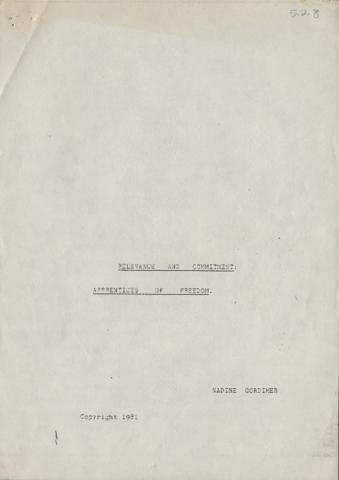Zona de identificação
Código de referência
Título
Data(s)
- 1982 (Produção)
Nível de descrição
Subsérie
Dimensão e suporte
14 pages
Zona do contexto
Nome do produtor
História administrativa
The Medu Art Ensemble was formed by South Africa exiles in Gaborone, Botswana, in 1978. The organisation produced a wealth of creative work across all major art-forms; the roup further played a key role in shaping aesthetic and cultural theory and praxis within Africanist and liberation struggles. On June 14 1985, the South African Defence Force attacked the homes of Medu members and other activists in Gaborone, killing 12 people; Medu as an organisation ceased to exist.
Nome do produtor
História biográfica
The daughters of Jewish immigrants, Nadine Gordimer was born in 1923 in Springs, a small town on the East Rand of Johannesburg. She went to a Convent school and later studied for a year at the University of the Witwatersrand without taking a degree. In 1948 she moved to Johannesburg, where she lived all of her life.
She began writing at the young age of nine and her first story was published in a South African magazine when she was only fifteen. Her first collection of short stories was published in 1949. "Face to Face" and the first novel "The Lying Days" appeared in 1953. Nadine Gordimer is an author of fourteen novels, thirteen story collections, five non-fiction collections, several volumes of essays, four film scripts derived from her fiction, and three documentary film scripts. She achieved lasting international recognition for her works and her awards include fifteen honorary doctorates , 11 literary awards and the Nobel Prize for Literature in 1991. Her novels and short stories have been published in 40 different languages.
Concerned about racial and economic inequality in South Africa from an early age, Nadine Gordimer joined, and became an active member of the African National Congress. During the Apartheid era she regularly took part in anti-Apartheid demonstrations in South Africa, and while travelling internationally spoke out against Apartheid, discrimination and political discrimination. She also resisted censorship and state control by serving on the Steering Committee of the Anti-Censorship Action Group.
In the post-Apartheid era, Nadine Gordimer continued to write about the effects of Apartheid and life in South Africa after 1994, and was active in the HIV/AIDS movement.
Nadine Gordimer died on the 13 July 2014 in Johannesburg.
Entidade detentora
História do arquivo
Paper presented at the Culture and Resistance Symposium, Gaborone, 5-9 July 1982.
Fonte imediata de aquisição ou transferência
Zona do conteúdo e estrutura
Âmbito e conteúdo
Nadine Gordimer writes this insightful paper on the key concepts of "relevance" and "commitment" in relation to black and white writers. She argues that black writers write from their communities and have daily lives which are embedded within relevant contexts. So too, their commitment to black liberation is innate. She suggests that white writers ought to break out of white value systems and a false consciousness to create relevant art and to openly admit that their experience as being white is of a different order to being black. These are the imperatives which both black and white writers face. The whole aim of art, in its attainment of truth and essence, requires the white writer to attain a true consciousness so that both black and white writers may work for the same end.
Avaliação, selecção e eliminação
Ingressos adicionais
Sistema de arranjo
Zona de condições de acesso e utilização
Condições de acesso
Condiçoes de reprodução
Permission to publish must be obtained from Gordimer, Nadine.


